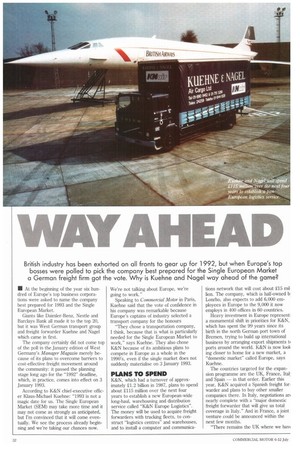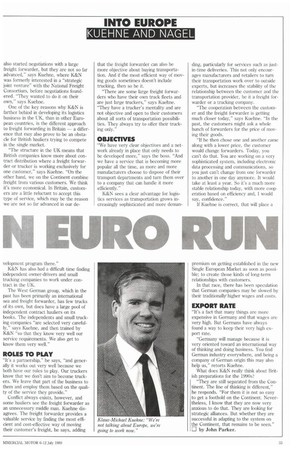INAIIAHEAD N EURO RUN
Page 34

Page 35

If you've noticed an error in this article please click here to report it so we can fix it.
• At the beginning of the year six hundred of Europe's top business corporations were asked to name the company best prepared for 1993 and the Single European Market.
Giants like Daimler-Benz, Nestle and Barclays Bank all made it to the top 20, but it was West German transport group and freight forwarder Kuehne and Nagel which came in first.
The company certainly did not come top of the poll in the January edition of West Germany's Manager Magazin merely because of its plans to overcome harriers to cost-effective freight movement around the community: it passed the planning stage long ago for the "1992" deadline, which, in practice, comes into effect on 3 January 1993.
According to K&N chief-executive officer Klaus-Michael Kuehne: "1993 is not a magic date for us. The Single European Market (SEM) may take more time and it may not come as strongly as anticipated, but I'm convinced that it will come eventually. We see the process already beginning and we're taking our chances now.
We're not talking about Europe, we're going to work."
Speaking to Commercial Motor in Paris, Kuehne said that the vote of confidence in his company was remarkable because Europe's captains of industry selected a transport company for the honours
"They chose a transportation company, I think, because that is what is particularly needed for the Single European Market to work," says Kuehne. They also chose K&N because of its ambitious plans to compete in Europe as a whole in the 1990's, even if the single market does not suddenly materialise on 3 January 1993.
PLANS TO SPEND
K&N, which had a turnover of approximately £1.2 billion in 1987, plans to spend about £115 million over the next four years to establish a new European-wide long-haul, warehousing and distribution service called "K&N Europe Logistics". The money will be used to acquire freight forwarders with trucking fleets, to construct "logistics centres" and warehouses, and to install a computer and communica tions network that will cost about .215 mil lion. The company, which is half-owned b Lonrho, also expects to add 6,000 employees in Europe to the 9,000 it now employs in 400 offices in 60 countries.
Heavy investment in Europe represent: a monumental shift in priorities for K&N, which has spent the 99 years since its birth in the north German port town of Bremen, trying to build up international business by arranging export shipments ti ports around the world. K&N is now look ing closer to home for a new market, a "domestic market" called Europe, says Kuehne.
The countries targeted for the expansion programme are the UK, France, hal: and Spain — in that order. Earlier this year, K&N acquired a Spanish freight forwarder and plans to buy other smaller companies there. In Italy, negotiations an nearly complete with a "major domestic freight forwarder that will give us total coverage in Italy." And in France, a joint venture could be announced within the next few months.
"There remains the UK where we hav( velopment program there."
K&N has also had a difficult time finding independent owner-drivers and small trucking companies to work under contract in the UK.
The West German group, which in the past has been primarily an international sea and freight forwarder, has few trucks of its own, but does have a large pool of independent contract hauliers on its books. The independents and small trucking companies "are selected very carefully," says Kuehne, and then trained by K&N "so that they know very well our service requirements. We also get to know them very well."
ROLES TO PLAY
"It's a partnership," he says, "and generally it works out very well because we both have our roles to play. Our truckers know that we don't aim to become truckers. We leave that part of the business to them and employ them based on the quality of the service they provide," Conflict always exists, however, and some hauliers see the freight forwarder as an unnecessary middle man. Kuehne disagrees. The freight forwarder provides a valuable service by finding the most efficient and cost-effective way of moving their customer's freight, he says, adding premium on getting established in the new Single European Market as soon as possible; to create those kinds of long-term relationships with customers.
In that race, there has been speculation that German companies may he slowed by their traditionally' higher wages and costs.
EXPORT RATE
"It's a fact that many things are more expensive in Germany and that wages are very high. But Germans have always found a way to keep their very high export rate.
"Germany will manage because it is very oriented toward an international way of thinking and doing business. You find German industry everywhere, and being a company of German origin this may also help us," retorts Kuehne.
What does K&N really think about British preparations for the 1990s?
"They are still separated from the Continent. The line of thinking is different," he responds. "For them it is not so easy to get a foothold on the Continent. Nevertheless, I know that they are now very anxious to do that. They are looking for strategic alliances. But whether they are successful in adapting to the system on the Continent, that remains to be seen." CI by John Parker.




















































































































